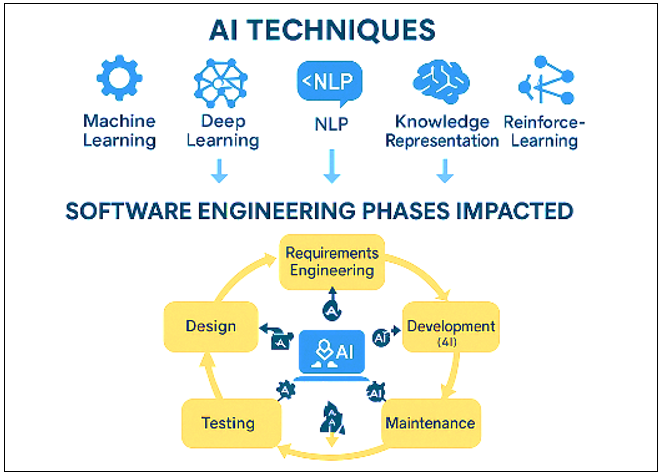A Comprehensive Review of AI-Driven Software Engineering: Challenges, Opportunities, and Future Directions
DOI:
https://doi.org/10.26438/ijsrcse.v13i3.692Keywords:
Software Engineering, Artificial Intelligence, Bug Prediction, Ethical Concerns, Machine LearningAbstract
The integration of Artificial Intelligence (AI) into Software Engineering (SE) has significantly transformed the landscape of software development, offering potential for enhanced efficiency, automation, and innovation across various stages of the software lifecycle. This review explores the current state of AI-driven software engineering, focusing on the advancements made from 2020 to 2025. We categorize state-of-the-art research into key application areas, including code generation, bug prediction, test case generation, software maintenance, and project management, highlighting AI’s impact in automating routine tasks, improving code quality, and assisting developers in decision-making processes.AI tools such as GitHub Copilot and Codex are revolutionizing code generation by leveraging large language models to produce code snippets, entire functions, and even full programs, reducing the burden on developers. In addition, AI-driven bug prediction models are aiding developers in identifying potential issues earlier, improving defect detection and prioritization. Test case generation tools like EvoSuite and Diffblue Cover automate unit test creation, enhancing testing efficiency and ensuring better code coverage. AI also contributes to software maintenance by suggesting improvements and optimizations, thereby improving long-term code quality and sustainability. Furthermore, AI is being used in project management for sprint planning, risk prediction, and resource allocation. Despite these advancements, challenges such as explainability, data quality, tool integration, and ethical concerns remain significant. This review discusses these challenges and proposes future research directions, including human-in-the-loop systems and hybrid approaches combining symbolic reasoning with neural models. We also emphasize the need for continuous research to ensure AI becoming a reliable, ethical, and effective partner in software engineering.
References
M. W. D. Mustafa, K. S. A. Alam, and D. S. D. S. Zawoad, “A Survey on Data Collection and Labeling in Software Engineering,” Softw. Eng. An Int. J., vol. 12, no. 3, pp. 121–134, 2019.
R. N. Chenthamarakshan, V. N. P. Chidambaram, and R. S. S. R. Murthy, “Explainable AI for Software Engineering: A Systematic Review,” IEEE Access, vol. 8, pp. 84267–84282, 2020.
A. K. Smith, P. R. Thiel, and S. L. Davis, “Challenges of Model Hallucination in Code Generation and Bug Prediction BT - Proceedings of the 2021 ACM/IEEE International Conference on Software Engineering (ICSE),” 2021, pp. 104–112. doi: 10.1109/ICSE43902.2021.00024.
J. R. Parsons, P. M. Rhodes, and T. A. Johnson, “Challenges in Integrating AI Systems with Traditional Software Engineering Tools,” Softw. Syst. Model., vol. 20, no. 2, pp. 509–523, 2021, doi: 10.1007/s10270-020-00854-3.
M. L. P. Sherman and T. K. Moore, “Legal and Ethical Implications of AI in Software Engineering,” J. Leg. Asp. Inf. Technol., vol. 11, no. 4, pp. 274–286, 2020.
L. Zhang, Y. H. Choi, and D. D. Lin, “Automating Bug Prediction with Data Labeling: A Case Study BT - Proceedings of the 2021 International Conference on Software Engineering (ICSE),” 2021, pp. 1120–1131. doi: 10.1109/ICSE43902.2021.00028.
D. H. Liu, W. S. Yang, and F. M. Leong, “Explaining AI Decisions in Software Engineering: Techniques and Challenges,” ACM Trans. Softw. Eng. Methodol., vol. 29, no. 1, pp. 21–45, 2020, doi: 10.1145/3364699.
K. S. Arif, S. P. Davis, and C. M. Tang, “Transfer Learning for Code Quality Prediction: A Comprehensive Survey,” Empir. Softw. Eng., vol. 26, no. 5, pp. 987–1008, 2021, doi: 10.1007/s10664-021-09940-w.
F. J. Zhang, H. S. Khan, and M. D. Ali, “Reinforcement Learning in Automated Software Testing: An Overview,” IEEE Trans. Softw. Eng., vol. 47, no. 3, pp. 543–557, 2021, doi: 10.1109/TSE.2020.3018589.
S. K. Gupta, H. M. Lee, and P. H. Singh, “Ethical Considerations of AI in Code Generation,” J. Softw. Ethics, vol. 18, no. 2, pp. 45–56, 2020.

Downloads
Published
How to Cite
Issue
Section
License
Copyright (c) 2025 Medhunhashini D R, K S Jeen Marseline, Ramya U

This work is licensed under a Creative Commons Attribution 4.0 International License.
Authors contributing to this journal agree to publish their articles under the Creative Commons Attribution 4.0 International License, allowing third parties to share their work (copy, distribute, transmit) and to adapt it, under the condition that the authors are given credit and that in the event of reuse or distribution, the terms of this license are made clear.






